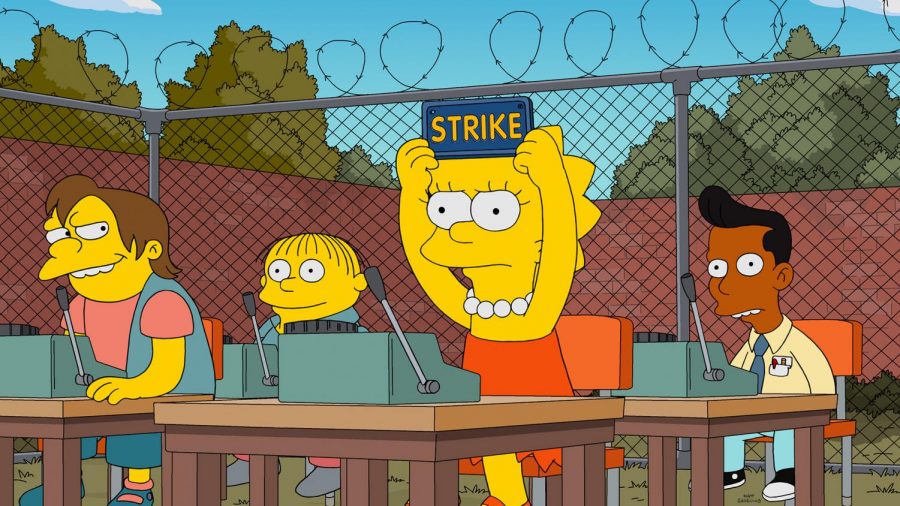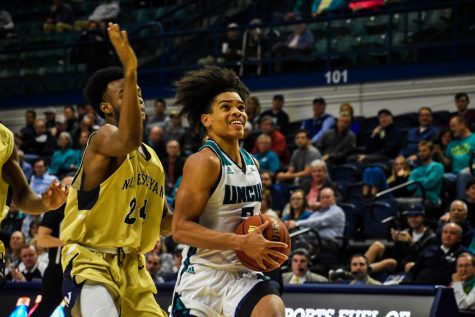Do not let businesses run wild for conveniences’ sake
FOX
A still from “The Simpsons.” Disney is pressing TV producers and other profit participants in its shows to accept a new compensation formula.
In March 2019, Disney acquired 21st Century Fox, and the general public was split on how this sudden shift in the world of entertainment should be viewed.
For some, this was an opening for more crossover between film franchises, most notably between Disney and Fox’s respective Marvel branches. To others, this was a sign of the end times, proof that the entertainment industry was about to face its apocalypse.
While the later does delve into a bit of hyperbole, there is a point to their skepticism. Disney and Fox merging created a serious imbalance in power within Hollywood, and it seems like no one cares because Disney has played their union off as if it is a good thing for the consumer. (“Oh, look! The Simpsons!”)
For decades, there were six major companies in media: Time Warner, Viacom, CBS, General Electric, Disney and NewsCorp (the one-time owner of Fox). With the last two merging in the spring of last year, the number of major companies has dropped to five, and the distance from first to second place is huge.
Disney, with 20th Century Fox in tow, took home 38 percent of the U.S. box office in 2019. Their closest competitor, Warner Bros., came away with 13.8 percent, less than half of Disney’s number. In comparison, Disney only accounted for 10.5 percent in 2008, meaning they have more than tripled in reach due to key purchases like Marvel, Lucasfilm and now Fox.
What is the problem with a company making money? Well, nothing when looking at just their gains; however, it is a lot more unsettling when you look at the losses that come with it.
Disney laid off 3,000 people in March 2019 after the merger went through, then fired 264 more people from Fox Studios the following summer. Disney also scrapped 200 films that were in development at Fox before the merger.
Now Disney likes money, so it stands to reason that they would not cancel a movie that they felt could be profitable. That being said, if Fox was already working on it, that means that at some point, they felt that the project could be profitable. Disney thinks like Disney, meaning Fox’s decisions are going to be worked around and jobs will continue to be lost if they do not fit Disney’s vision.
That is the problem with this level of power. Creatively, we will enter a dearth of stories that do not fit into a certain mold, and when modern Disney seems more preoccupied with sequels and remakes than anything, that mold does not seem to be the loosest thing.
There is a lot to talk about with Disney’s ensuing monopoly—their bullying of theaters, their bullying of Sony (supported by angry Spider-Man fans), their usage of the “Disney vault” method with their new (old) Fox films—but this article is not supposed to be a takedown of Disney. That is a losing battle.
This article is a question to consumers: is a better Disney+ worth all of this? More pointedly, is convenience worth a less competitive market? And, in the biggest sense, is convenience worth being jerked around by businesses?
Disney is not the only company that understands that you can sneak around as long as your users are having an easy time, and they are also far from the most malicious. Much further down the line is Facebook.
Facebook is a major source in the spread of fake news and recently tried to pay their way into a “sponsored editorial” from Teen Vogue. Facebook’s lies about the number of viewers their videos were getting were detrimental to print media and may have led to the deaths of sites like Machinima and College Humor. Facebook’s shady security measures led to 50 million accounts’ data being stored away and given to Cambridge Analytica, and that probably includes my account and yours.
But Facebook keeps you in touch with old friends and family. It reminds you of people’s birthdays. You get to look at memes and dog videos. Even if you are one of the hip young kids who have long moved on to Instagram or WhatsApp, Facebook bought both of those sites years ago, so you are not as far away from the problem as you may think.
Facebook as a company puts out a convenient product—three of them, actually — and maybe the Oculus will be convenient one day as well. But is any of it worth the mountain of unethical stuff they do to make it all run?
Problems do not end with Facebook and Disney. The NBA and Blizzard were really shady about the Hong Kong riots last year. The WWE has bi-annual Saudi Arabian propaganda shows, even in the wake of Jamal Khashoggi’s death. Any company that sells diet soda is tricking you if they tell you anything other than, “diet sodas are still bad,” and even if they are not saying that diet sodas are healthy, they are not not saying it, either.
I cannot say with confidence that there is a single big business that is 100 percent “good to go,” but some are worse than others. Are the companies listed above the worst of the worst? Probably not, but these are the companies in my cultural bubble, which means they are the ones I can best affect by avoiding them.
Look into the companies you support. Boycott ones that are not worth supporting. Let your wallet be the great equalizer that it can be.



![A map of emergency callboxes on campus. (UNCW) [hyperlink: https://uncw.maps.arcgis.com/apps/webappviewer/index.html?id=579a0e90030c4864a41c70fbe06338d9 ]](https://theseahawk.org/wp-content/uploads/2023/12/IMG_6388-600x277.png)



